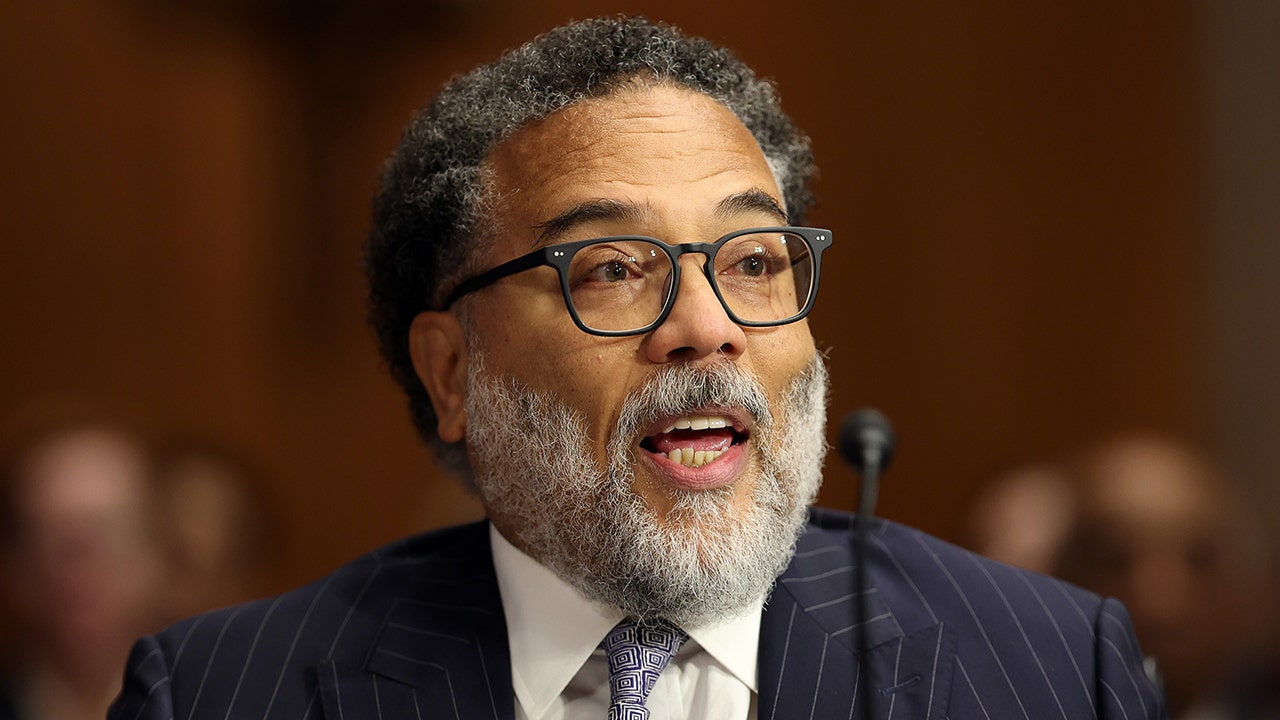Education
Teacher Is Fired for Reading Book on Gender Identity in Class

A teacher in an Atlanta suburb has been fired for reading a book to fifth-grade students that explores gender roles and identity through the eyes of a child who describes their shadow as purple, her lawyer said on Friday.
The Cobb County Board of Education voted 4-3 on Thursday to approve the recommendation by the superintendent, Chris Ragsdale, to terminate the contract of the teacher, Katherine Rinderle, according to a recording of the meeting.
“The district is pleased that this difficult issue has concluded; we are very serious about keeping our classrooms focused on teaching, learning, and opportunities for success for students,” the Cobb County School District said in a statement on Friday.
The statement said, “The Board’s decision is reflective of that mission.”
Ms. Rinderle, 33, was a teacher at Due West Elementary School in Marietta, Ga., which is northwest of Atlanta.
In February, she purchased “My Shadow Is Purple,” by the Australian author Scott Stuart, at a district-approved book fair, and read it to her class on March 8.
The book centers on a gender nonbinary theme in which a child describes the color of their shadow as different from their mother’s pink shadow and father’s blue shadow.
In an interview on Friday, Ms. Rinderle said the students discussed the book, in which the child enjoys toys and sports commonly associated with either boys or girls. Then they were encouraged to write poems describing their own “shadows.”
“The book was a picture book about a child who had many different interests,” she said. “They were really able to relate to the importance of belonging.”
After she read the book, she received emails from some parents who complained, while others told her they appreciated its message affirming people’s differences.
“What the district has decided, unfortunately, is truly not representative of all parents’ viewpoints,” she said of the firing.
In June, Mr. Ragsdale said in a letter to Ms. Rinderle that the district intended to terminate her employment for “insubordination, willful neglect of duties and any other good and sufficient cause,” a copy of the letter said.
It said the “controversial” topic of gender identity and fluidity was “not an appropriate” topic for 10- and 11-year old students.
It included objections that she told the class to use “they” and “them” pronouns when discussing the book in class, and it objected to her use in class of another children’s book written by Stacy Abrams, the Democrat who ran against Gov. Brian Kemp in 2022.
In a two-day hearing last week, a panel appointed to review the case agreed Ms. Rinderle had “neglected her duties and that there was sufficient cause to take action,” but it rejected Mr. Ragsdale’s recommendation to fire her, her lawyer, Craig Goodmark, said in an interview.
The Board of Education, however, voted along partisan lines on Thursday, with three Democrats opposing her termination and four Republicans approving.
Cobb County was once reliably conservative but has undergone a demographic and political shift. It voted for Joe Biden by 14 percentage points in 2020 and Democrats swept major countywide races, though they have yet to capture control of the county school board.
During the public comments, parents and educators touched on parental rights, inclusion and trust in teachers.
One man, wearing a shirt that read “Ban Bias, Not Books,” said he and his wife tell their child to “be kind to everyone, always.”
“That is what inclusion is all about,” he said. “It isn’t about indoctrination or grooming.”
Another parent said the school must communicate with parents before the discussion of some topics, including sex education.
The decision reflected several laws signed last year by Gov. Kemp.
One law, the Parents’ Bill of Rights, “provides greater transparency to parents and legal guardians regarding what their student is being taught in school and protects the fundamental right of moms and dads across this state to direct the education of their child.”
Another law is meant to prevent “divisive concepts and ideologies from invading the classroom.”
Mr. Goodmark said the laws “have operated to censor teachers in the classroom.”
Ms. Rinderle can appeal to the state Board of Education or possibly take other legal action, he said.
The Cobb County School District has more than 106,000 students, making it the state’s second largest.
The public comments at the board meeting echoed some of the debate in schools across the United States, touching on privacy rights, parental consent, reading materials, sports teams, bathroom use and dress codes.
The American Library Association, which curates lists of the most challenged books every year, said that before 2020, most complaints came from parents who wanted to remove or restrict access to a book.
Since then, there has been more evidence of a “growing, well-organized, conservative political movement” attempting to remove books about race, history, gender identity, sexuality, and reproductive health from public libraries and public schools, it said.

Education
Video: Several Killed in Wisconsin School Shooting, Including Juvenile Suspect

new video loaded: Several Killed in Wisconsin School Shooting, Including Juvenile Suspect
transcript
transcript
Several Killed in Wisconsin School Shooting, Including Juvenile Suspect
The police responded to a shooting at a private Christian school in Madison, Wis., on Monday.
-
Around 10:57 a.m., our officers were responding to a call of an active shooter at the Abundant Life Christian School here in Madison. When officers arrived, they found multiple victims suffering from gunshot wounds. Officers located a juvenile who they believe was responsible for this deceased in the building. I’m feeling a little dismayed now, so close to Christmas. Every child, every person in that building is a victim and will be a victim forever. These types of trauma don’t just go away.
Recent episodes in Guns & Gun Violence
Education
Video: Biden Apologizes for U.S. Mistreatment of Native American Children

new video loaded: Biden Apologizes for U.S. Mistreatment of Native American Children
transcript
transcript
Biden Apologizes for U.S. Mistreatment of Native American Children
President Biden offered a formal apology on Friday on behalf of the U.S. government for the abuse of Native American children from the early 1800s to the late 1960s.
-
The Federal government has never, never formally apologized for what happened until today. I formally apologize. It’s long, long, long overdue. Quite frankly, there’s no excuse that this apology took 50 years to make. I know no apology can or will make up for what was lost during the darkness of the federal boarding school policy. But today, we’re finally moving forward into the light.
Recent episodes in Politics
Education
Video: Los Angeles Bus Hijacked at Gunpoint

new video loaded: Los Angeles Bus Hijacked at Gunpoint
transcript
transcript
Los Angeles Bus Hijacked at Gunpoint
The person suspected of hijacking a bus which killed one person, was taken into custody after an hourlong pursuit by the Los Angeles Police Department early Wednesday morning.
-
“Get him.”
Recent episodes in Guns & Gun Violence
-

 Business7 days ago
Business7 days agoThese are the top 7 issues facing the struggling restaurant industry in 2025
-

 Culture7 days ago
Culture7 days agoThe 25 worst losses in college football history, including Baylor’s 2024 entry at Colorado
-

 Sports6 days ago
Sports6 days agoThe top out-of-contract players available as free transfers: Kimmich, De Bruyne, Van Dijk…
-

 Politics5 days ago
Politics5 days agoNew Orleans attacker had 'remote detonator' for explosives in French Quarter, Biden says
-

 Politics5 days ago
Politics5 days agoCarter's judicial picks reshaped the federal bench across the country
-

 Politics3 days ago
Politics3 days agoWho Are the Recipients of the Presidential Medal of Freedom?
-

 Health2 days ago
Health2 days agoOzempic ‘microdosing’ is the new weight-loss trend: Should you try it?
-

 World7 days ago
World7 days agoIvory Coast says French troops to leave country after decades














